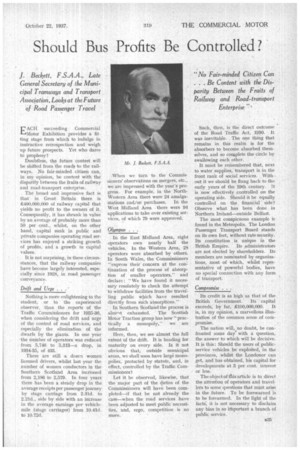Should Bus Profits Be Controlled
Page 69

If you've noticed an error in this article please click here to report it so we can fix it.
J. Beckett, F.S.A.A., Late General Secretary of the Municipal Tramways and Transport Association, Looks at the Future of Road Passenger Travel "No Fair-minded Citizen Can . . Be Content with the Disparity Between the Fruits of Railway and Road-transport Enterprise
EACH succeeding Commercial Motor Exhibition provides a fitting stage from which to indulge in instructive retrospection and weigh up future prospects. Yet who dares to prophesy?
Doubtless, the future contest will be shifted from the roads to the railways. No fair-minded citizen can, in my opinion, be content with the disparity between the fruits of railway and road-transport enterprise.
The broadand impressive fact is that in Great Britain there is 400,000,000 of railway capital that yields no profit to the owners of it. Consequently, it has shrunk in value by an average of probably more than 50 per cent., whilst, on the other hand, capital sunk In public and private companies operating road services has enjoyed a striking growth of profits, and a growth in capital values.
It is not surprising, in these circumstances, that the railway companies have become largely interested, especially since 1928, in road passenger conveyance.
Drift and Urge .
Nothing is more enlightening to the student, or to the experienced observer, than the reports of the Traffic Commissioners for 1935-36, when considering the drift and urge of the control of road services, and especially the elimination of the dwarfs by the giants. In one year -the number of operators was reduced from 5,746 to 5,313—a drop, in 193435, of 433.
There are still a dozen women licensed drivers, whilst last year the number of women conductors in the Southern Scotland Area increased from 2,186 to 2,579. In four years there has been a steady drop in the average receipts per passenger journey by stage carriage from 2.3Id. to 2.21d., side by side with an increase in the average earnings per vehiclemile (stage carriages) from 10.41d. to 10.72d.
When we turn to the Commissioners' observations on mergers, etc., we are impressed with the year's progress. For example, in the NorthWestern Area there were 24 amalgamations and/on purchases. In the West Midland Area , there were 94 applications to take over existing services, of which 79 were approved.
Olympus . . .
In the East Midland Area, eight operators own nearly half the vehicles. In the Western Area, 28 operators were absorbed by others. In South Wales. the Commissioners "'express their concern at the continuation of the process of absorption of smaller operators," and declare "We have found it necessary resolutely to check the attempt to withdraw facilities from the travelling public which have resulted directly from such absorptions,"
In Southern .Scotland the process is alniost exhausted. The Scottish Motor Traction group has now "practically a monopoly,' we are informed, Here, then, we see almost the full extent of the drift. It is heading for maturity on every side. Is it not obvious that, outside municipal areas, we shall soon have large monopolies, protected by statute, and, in effect, controlled by the Traffic Commissioners'?
Let it be observed, likewise, that the major part of the duties of the Commissioners will have been completed—if that be not already the case—when the road services have been adjusted to meet public necessities, and, ergo, competition is no more. Such, then, is the direct outcome of the Road Traffic Act, 1930. It was inevitable. The one thing that remains in this realm is for the absorbers to become absorbed themselves, and so complete the circle by swallowing each other.
It must be remembered that, next to water supplies, transport is in the front rank of social services. With-. out it we should be flung back to the early years of the 19th century. It is now effectively controlled on the operating side. Should it be equally controlled on the financial side? Observe what has been done in Northern Ireland—outside Belfast.
The most conspicuous example is found in the Metropolis. The London Passenger Transport Board stands on its own feet, without rate security. Its constitution is unique in the British Empire. Its administrators are not elected by shareholders. Its members are nominated by organizations, most of which, whilst representative of powerful bodies, have no special connection with any form of transport.
Compromise . . .
Its credit is as high as that of the British Government. Its capital exceeds, by far, £100,000,000. It is, in my opinion, a marvellous illustration of the common sense of compromise.
The nation will, no doubt, be confronted some day with a question, the answer to which will be decisive. It is this: Should the users of publicservice vehicles be exploited, in the provinces, whilst the Londoner can get, and has obtained, his capital for developments at 3 per cent. interest or less.
The object of this article is to direct the attention of operators and travellers to some questions that must arise in the future. To be forewarned is to be forearmed. In the light of the facts, it is not necessary to disclaim any bias in so irbportant a branch of public service.
























































































































